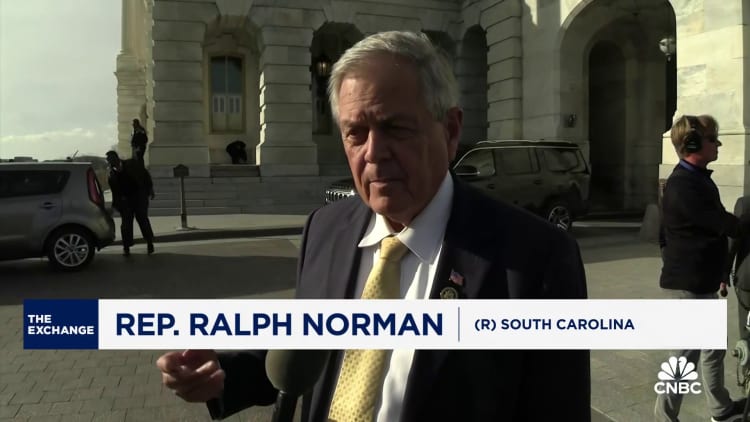We support our Publishers and Content Creators. You can view this story on their website by CLICKING HERE.
- As the Senate wraps up its final legislative days for the year, it is expected to vote on a bill that would increase Social Security benefits for about 3 million people.
- The Social Security Fairness Act calls for eliminating certain rules that have been in place for decades that reduce Social Security benefits for some people with public sector pensions.
The Senate is getting closer to a final vote on a bill that would increase Social Security benefits for an estimated 3 million people.
The chamber voted Wednesday to let consideration of the bill — the Social Security Fairness Act — proceed. The bipartisan proposal calls for repealing certain rules that reduce Social Security benefits for individuals who receive pension income from work in the public sector.
Despite a bipartisan 73 majority vote to proceed, the effort to advance the bill was met with some dissent, with Sen. Thom Tillis, R-N.C., citing the costs associated with the change. The Congressional Budget Office has estimated repealing the rules — known as the Windfall Elimination Provision, or WEP, and Government Pension Offset, or GPO — would cost $196 billion over 10 years.
The WEP reduces Social Security benefits for individuals who receive pension or disability benefits from jobs where they did not pay Social Security payroll taxes. The GPO reduces Social Security benefits for spouses, widows and widowers who also receive their own government pension income.

Passing the bill would speed up Social Security’s trust fund insolvency dates by six months, according to the Committee for a Responsible Federal Budget. Without the change, Social Security’s trustees have projected the trust fund the program relies on to pay retirement benefits will run out in 2033, when 79% of those benefits will be payable.
“We are about to pass an unfunded $200 billion spending package for a trust fund that is likely to go insolvent over the next nine to 10 years, and we’re going to pretend like somebody else has to fix it,” Tillis said during a Senate speech ahead of the vote to advance the bill.
Tillis said lawmakers are not considering the 97% of beneficiaries who would not benefit from the bill, but who would be hurt by future consequences that passing it would have on the program.
More from Personal Finance:
Answers to common questions on the Social Security Fairness Act
73% of workers worry Social Security won’t be able to pay benefits
Early retirement is a surprise for many workers, study finds
“Ladies and gentlemen, this bill has not even had a hearing in any committee in the House or the Senate,” Tillis said.
The Social Security Fairness Act was approved by the House in November after two lawmakers – Reps. Abigail Spanberger, D-Va., and Garret Graves, R-La. – filed a discharge petition to force a vote on the bill. The Senate cloture vote to proceed to a final vote also limited the ability for that chamber to debate the proposal.
The 27 Senate leaders who voted “no” on moving the Social Security Fairness Act to a final vote are all Republicans, with the exception of Sen. Joe Manchin, an independent representing West Virginia.
The Senators who voted to move the bill forward included a mix of Democrats and Republicans, including Senate Majority Leader Chuck Schumer, D-N.Y., and Vice President-elect and Sen. JD Vance, R-Ohio.
‘No excuse for treating our public servants this way’
Leaders who spoke on the Senate floor in support of the bill ahead of Wednesday’s vote to proceed cited the financial suffering of their constituents.
As of November, more than 2 million people’s Social Security benefits were affected by the WEP, while more than 650,000 people were impacted by the GPO, said Sen. Susan Collins, R-Maine, who co-led the Senate version of the bill.
One 72-year-old constituent had to return to work after her husband died, since the GPO reduced her Social Security widow benefits by two-thirds, Collins said.
“She did not have the financial security any longer to remain retired, and the GPO penalty left her with few choices but to return to work,” Collins said.
Sen. Bill Cassidy, R-La., recalled meeting with a retired Louisiana schoolteacher impacted by the GPO, who cried in his office because she didn’t understand why her Social Security spousal benefits were reduced.
“She felt like she was being punished for educating generations of Louisiana children,” Cassidy said. “There’s no excuse for treating our public servants this way.”
If the Senate passes the bill, it will be a win for Collins and Sen. Sherrod Brown, D-Ohio, who co-led the bill. Collins has pushed for the change for more than two decades, Brown noted in a Wednesday Senate speech. Brown is leaving the Senate after losing a reelection campaign.
Reps. Spanberger and Graves, who introduced the House bill, are also leaving Congress.
“If you love this country and fight for the people who make it work, I urge all my colleagues on both sides to join us — restore the Social Security that people who protect us in service have earned over a lifetime of work,” Brown said during a Wednesday Senate speech.

 Conservative
Conservative  Search
Search Trending
Trending Current News
Current News 





